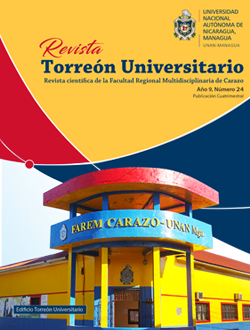Evaluation of DNA extraction methodologies from recalcitrant plants
DOI:
https://doi.org/10.5377/torreon.v9i24.9723Keywords:
DNA, extraction, commercial kits, protocols, recalcitrantAbstract
Obtention of high-quality purified deoxyribonucleic acid (DNA) is key for the subsequent application of molecular techniques during the characterization of species under study. In this regard, plant extracts can be challenging due to its complex metabolites composition and to the fact that often these chemicals concentration differs across varieties and even samples. This is, for instance, the case for recalcitrant samples of cocoa varieties (Theobroma cacao) and coffee (Coffea arabica), where DNA loss can occur during sample maceration due to phenolization. In this research, three commercial kits, already known by producing excellent recoveries for non-recalcitrant varieties, were evaluated. Additionally, the modification of traditional protocols [Doyle & Doyle (1987) and Doyle & Doyle (1990)] was also evaluated. Results obtained confirm the effect of variety and species on DNA extraction and for some species modified methods may yield DNA recovery and purity higher than those obtained by commercial kits.
Downloads
Downloads
Published
Issue
Section
License
The authors who publish in this journal agree to the following terms.
- The author or authors of the articles, essays or research grant the National Autonomous University of Nicaragua, Managua (UNAN-Managua) the editing rights (copyright) of the submitted work, therefore the University has the exclusive right to publish the article for the entire copyright period.
- These copyrights/authors authorize Torreón Universitario Magazine and the University to edit and disseminate/publish the article in said Magazine, including printed and electronic reproduction, storage, retrieval and any other type of publication, and sources of secondary information as services. of summaries and databases, they also empower it to protect the article against unauthorized use for dissemination by printed or electronic media (PDF, HTML, EPUB, XML or others).
License for use of content
The magazine uses the Creative Commons Attribution-NonCommercial-NoDerivs 4.0 International License.
Under this statement:

This journal is licensed under a Creative Commons Attribution-NonCommercial-NoDerivatives 4.0 International License. It can be copied, distributed and transmitted publicly as long as the author and source are cited (Revista Torreón Universitario), it should not be modified or used for any commercial purpose. The full license can be found at http://creativecommons.org/licenses/by-nc-nd/4.0/.



